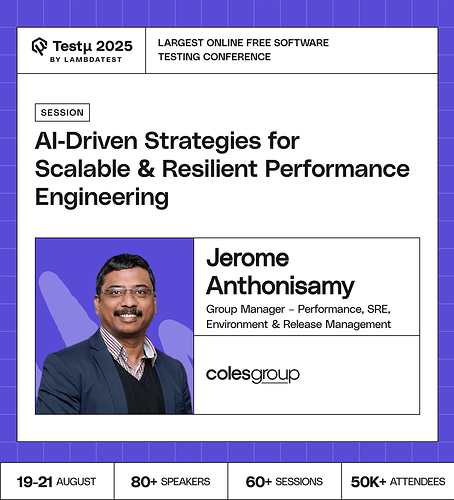Join us for an exciting live online session with Jerome Anthonisamy, Group Manager, Performance, SRE, Environment & Release Management at Coles Group.
Explore how AI is reshaping Quality Engineering and Performance Engineering, driving a paradigm shift across People, Process, and Technology. Jerome will share insights on:
- AI-driven strategies for scalable and resilient performance engineering
-
Continuous performance testing with AI acceleration
- The innovative Defect Management Service Intelligence (DMSI) approach
 For Developers & Testers: Discover how AI impacts daily workflows and how to leverage it for faster, smarter delivery.
For Developers & Testers: Discover how AI impacts daily workflows and how to leverage it for faster, smarter delivery.
 For Managers & Leaders: Learn how to transform your QE/PE journey with AI-enabled accelerators and tools like LambdaTest.
For Managers & Leaders: Learn how to transform your QE/PE journey with AI-enabled accelerators and tools like LambdaTest.
Don’t miss this chance to gain practical strategies from a leader who’s driving AI-powered transformation in enterprise performance engineering. Register Now!
How can AI help make performance engineering more scalable without adding too much complexity?
How does the AI Accelerated PE method simplify the challenge of pinpointing the true root cause of performance slowdowns when engineers are overwhelmed with vast amounts of monitoring metrics?
What practices ensure that the datasets used in performance engineering are both high-quality and diverse enough to minimize bias and promote fair, reliable AI models?
How do People, Process, and Technology need to evolve collectively to maximize the benefits of AI?
As AI takes over more of the analysis and prediction in performance engineering, what becomes the new core competency for a human Performance Engineer? Do they become more of an AI model trainer, a systems architect, or a business-risk analyst?
What’s the sweet spot between AI-led automation and human-led intuition in performance tuning?
Could you explain the new concept of ‘Defect Management Service Intelligence’ (DMSI) in simple terms and give one example of how it works?
How does the ‘AI Accelerated PE’ approach specifically help with one of the most time-consuming parts of performance engineering: identifying the actual root-cause bottleneck from a mountain of monitoring data?
What’s the balance between cost and coverage—how do we scale performance testing without exploding infrastructure bills?
How is data quality and diversity addressed to prevent bias and make sure of the reliability and fairness of AI models in performance engineering?
What are the key differences between an “AI Accelerated PE approach” and traditional performance engineering methods, specifically regarding efficiency, accuracy, and resource utilization?
How can AI shift performance engineering from being reactive (issue detection) to proactive (issue prevention)?
As AI copilots generate tests and triage issues, will tomorrow’s QA pros be more like data curators or testing strategists?
In the transition to AI-driven performance engineering, how does the human role evolve from manual execution to strategic oversight, what new skills will be most critical for success, and what is the biggest challenge to a widespread adoption of this
As systems scale dynamically in the cloud, how can performance engineering evolve from reactive monitoring to proactive resilience strategies that prevent issues before they impact users?
How do we ensure that performance insights stay relevant when architectures are shifting constantly (microservices, serverless, edge)?
What are the key challenges of using AI for performance testing, and how would you mitigate them?
Concept of a “self-healing” performance system. What are the pros and cons of this approach, and when would you recommend it?
What are the process or idealogies that you used to leverage AI in the Quality world? Could you share some insights so we could takeaway some key insights
![]() For Developers & Testers: Discover how AI impacts daily workflows and how to leverage it for faster, smarter delivery.
For Developers & Testers: Discover how AI impacts daily workflows and how to leverage it for faster, smarter delivery.![]() For Managers & Leaders: Learn how to transform your QE/PE journey with AI-enabled accelerators and tools like LambdaTest.
For Managers & Leaders: Learn how to transform your QE/PE journey with AI-enabled accelerators and tools like LambdaTest.